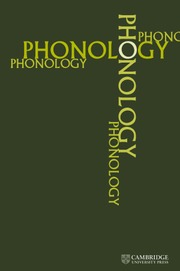Article contents
Consumer's guide to evidence in phonology
Published online by Cambridge University Press: 20 October 2008
Abstract
The purpose of evidence adduced in support of a theory is not to prove that theory true but to demonstrate that competing theories account for facts less well and thus no longer demand our attention. Evidence therefore, if it can unambiguously decide between competing theories, helps the discipline to spend its resources on only a few issues at a time. I evaluate this winnowing capacity of various kinds of evidence which have been offered in support of hypotheses on what knowledge native speakers' have about the sound patterns in their language and how they use it: surface sound patterns, sound change, poetry, speech errors, word games, and experiments. I argue that experiments provide evidence of the highest quality. Four experiments are reported, three psychological and one phonetic, which offer evidence on the following claims: (a) the psychological basis of speakers' awareness of phonotactics, (b) speakers' awareness of the morphemic constituents of complex derived words, (c) whether epenthetic stops of the sort evident in words like team[p]ster are added by purely mechanical constraints of the articulatory apparatus or whether they can be attributed to higher, pre-phonetic levels, and (d) the factors that determine speakers' assignment of allophones to phonemes.
- Type
- Research Article
- Information
- Copyright
- Copyright © Cambridge University Press 1986
Footnotes
I gratefully acknowledge the helpful comments and criticisms of members of the audience at the Department of Linguistics, University of Michigan, especially R. Rhodes and P. Benson, where this paper was first presented. In addition I thank M. Caisse, J. Jaeger and S. Pearson for help and advice in the conduct of the experiments and J. Jaeger, C. Gussenhoven, G. Nathan and M. Ohala for insightful critiques of an earlier version of this paper. Errors and infelicities which remain are on my head. Portions of the research reported here were funded by the Committee on Research, University of California.
References
- 32
- Cited by


